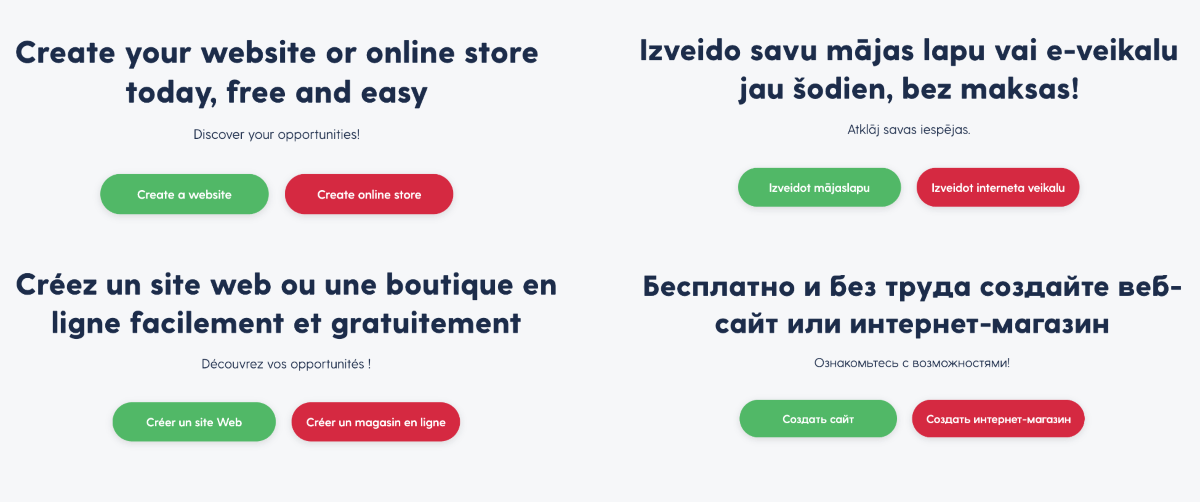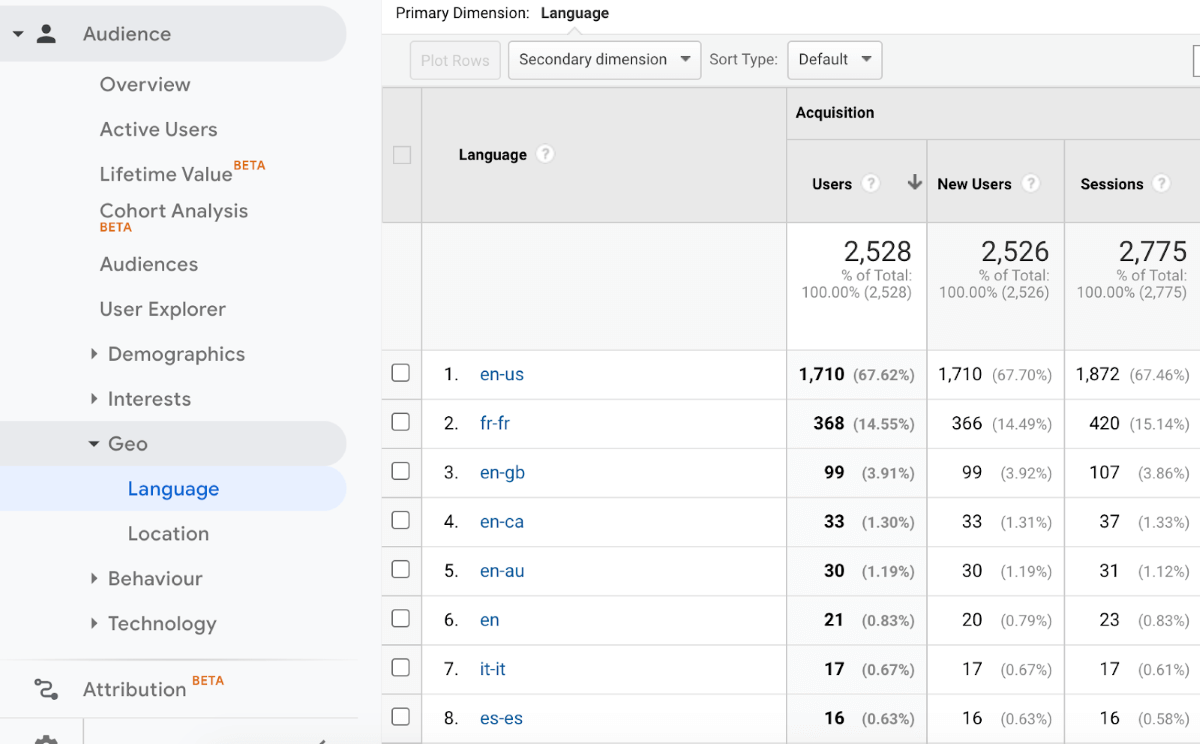To localize or not to localize – is it time to translate your website into other languages?

When we launched the Mozello website back in 2013, we began with 2 languages - English and Latvian. Among our first priorities was adding further major languages, such as French, German, and Russian. Today, we're at 18. Localization has been key to our growth and helped establish a presence in markets worldwide by making our services as accessible as possible.

Of course, it's not just us. For decades, everyone - from giant corporations to small businesses - has relied on localization to ensure success in international markets, attaining new heights by customizing their offerings to local audiences. Perhaps it's time for you to do the same?
What's localization?
Localization means tailoring your website to suit a specific market's customers and visitors. It means speaking their language, being responsive to the cultural context, and offering an experience they're familiar with. This, in turn, makes users feel welcome and understood, which significantly impacts purchasing decisions.
Some concrete examples of localization would be launching sales campaigns based on local holidays and using local models for banners and product photos, among other things. Translation, however, is at the center of it all. Beyond just tailoring to specific preferences, translation makes your website accessible to more people, thus growing your potential audience.

Thanks to service globalization and modern technologies, it's becoming increasingly easy to enter new markets and expand across borders. Whether we're talking about the patchwork of nations that is Europe, or about the United States which are home to as many Spanish speakers as the entire country of Spain, or about any other region for that matter, most businesses will face a need for localization sooner rather than later if they want to stay competitive.
5 benefits of localization for your website or online store
Let's dive into 5 main benefits you could take advantage of by translating your website into other languages.
1. Grow your audience
As mentioned, by adding a new language to your website you're unlocking access to a new customer base. Whether you're looking for a piece of the billion-customer global market, or want to target your home market's differently-speaking population, simply having an online presence is not enough.
A customer that doesn't understand your offering will either bounce immediately or potentially grow frustrated trying to navigate a foreign environment, making a conversion unlikely. To that point, an EU study reported that “9 in 10 Internet users in the EU said that, when given a choice of languages, they always visited a website in their own language”. So don't underestimate the essential role of localization and accessibility.
2. Build trust
Speaking your customer's language makes them feel like they belong, like this store or website is meant specifically for them. Rather than being a faceless business trying to brute-force its way into more wallets, you're striking up a conversation and telling the customer that you want to be part of their community. The deeper you go with localization, the more likely it becomes you induce a relationship of trust and appreciation, improving customer satisfaction.
But be careful! Always have someone check if your translation hasn't committed any cultural/linguistic faux pas, or you might end up with a mess on your hands. Here's a legendary example of just that: back in the 1980s, KFC's (Kentucky Fried Chicken) iconic catchphrase of “Fingerlickin' good” didn't translate to Chinese very well and, hilariously, came out as “Eat your fingers off”.

3. Improve your visibility
What's the first thing people do when they're looking for something online? Head straight to Google, of course. As a website/business owner, you've probably grown to appreciate the free traffic you can receive from Google search results. If not, then check out our article on SEO and how it can benefit your website.
The fact of the matter is that most people seek results in their native language - you can take a look for yourself at 2019's trending Google searches by country right here. By translating your website, you're significantly improving your online visibility and, hence, chances of being found by potential customers. Conquering Google is particularly easy for niche websites that don't have a lot of competition, but anyone can benefit from this.
4. Gain a competitive advantage
Localizing your website is a great way to stand out among competitors, especially when their offering comes in a single language. By being the first to tailor to a specific market segment, you can build up a loyal customer base that you're unlikely to lose, even if competitors follow suit and also introduce the same language.
In this day and age, people are business-savvy and chances are that your competition already has some form of localization in place. In this case, it's more about not losing, rather than gaining, your competitive advantage. If you let your competition take a significant amount of your market share, then you'll be fighting an uphill battle for years to come. When it comes to localization, you need to be proactive, not reactive.
5. Enhanced revenue potential
At the end of the day, every business’s bottom line is growing revenue. The localization benefits listed above directly contribute to potential growth - a bigger audience, better user experience, wider reach, and having a leg up on your competitors. In short, you'll have more and happier potential customers.
Now, whether they convert is another matter. Your website must be up to par in terms of the design, user journey, and the general experience. If people are already complaining about your website, then the only thing localization will achieve is that now more people will complain and do so in multiple languages. Localization gives you the potential for explosive growth. Whether you take advantage of it or not - that's on you.
The main challenge of localization - it's a lot of work
Localization is a venture that's not to be treated lightly and can prove to be a challenge for businesses big and small. The bigger your website, the more time and resources it'll take to translate everything. On top of that, you might have to face some recurring costs in terms of translating latest offerings and providing customer support for the languages you add. That being said, it's a small price to pay for the potential benefits.
The good news is that you don't have to translate your entire website. Translating things like blogs, case studies, videos, while good to do, isn't essential for providing a localized buying experience. You should focus primarily on the homepage, your product offering, and your about page, as well as any other top-visited pages you may have. To give an example, we don't have a blog section on our French page - we only translated the most essential things.
What's more, Mozello's website builder makes the technical side of adding and managing languages easy and smooth. With Mozello, adding a new language takes just a few clicks - 6, to be exact.
You can also copy pages between languages, so you don't have to rebuild them from scratch. Nor do you have to worry about adding new products - simply adjust the language and elements for the existing ones. This saves you lots of time, which can be put to better use in ensuring the translation is high quality.
We cannot stress this enough - a good translation is crucial for a successful localization strategy. Bad localization won't just fail to bring in customers, it might create a long-term negative perception of your business. First impressions matter, so you need to put your best foot forward.
4 major signs it's the right time to localize
When should you start thinking about localization? As soon as possible. If you've got any plans for future business expansion, the sooner you start laying the groundwork, the easier it'll be. That being said, here are 4 specific scenarios signaling that now's the perfect time to get started:
1. A part of your existing audience speaks a different language
The single most important indicator that localization is urgently needed is if your business already receives a notable number of visitors speaking a language you're not offering yet. You might be sitting on an untapped revenue goldmine. The audience is there - it's time to monetize!
There are 3 ways to check your existing visitor language preferences:
A. Google Analytics
Open up your Google analytics, then head to Audience > Geo > Language, and… that's it.

An example of an English website with a significant portion of French-speaking visitors
Here you can find the most basic data regarding the main languages of your visitors. If you notice that there's a different language spoken by a significant portion of your customer base, then you should consider translating.
B. Social media analytics
Social media analytics is another potential source of user language insights. For example, for Facebook you can head to facebook.com/ads/audience-insights and then navigate to Location > Top Languages, to discover insights about your audience.
Sometimes, you don't even need the analytics. Seeing comments and replies in different languages can be enough of a sign that you should investigate just how much of your audience speaks a language that you don't offer and if it's worth offering it.
C. Other communication channels
Finally, if you've been getting support requests in other languages, have come across reviews in languages you don't offer, or have seen people talking about your website in differently-speaking forums, then it's a sign that there's a buzz about you among audiences other than your main one(s).
This is often a good first sign that you should check your Google Analytics to see if there's an audience you're not catering to.
2. You're moving into a new market
If you're moving into a new market, localization is a no-brainer. Throughout this article, we've made a case for the value of speaking your customer's language and how doing so is key to being accepted by local consumers.
Localization is inevitable if your original language(s) isn't widely spoken in your new market. However, while localization is a must-have element of your strategy, it's generally suggested to avoid fully translating your website before you enter a market and rather do so after you've tested the waters, given the significant investment that it requires.
You can test the waters with a single landing page, or launching an ad campaign leading to a few translated product pages. Once you're certain there's demand, then it's time to fully localize.
3. Your competition is adding new languages
It's always a good idea to keep an eye on what your direct competitors are up to. After all, you're fighting for the attention of the same people. So, if on one of your weekly check-ups you notice that they're introducing a new language, then you need to react and do it fast.
Of course, this doesn't mean jumping headfirst into translating your website. Rather, it's a sign that there's an opportunity they're looking to take advantage of. Leverage your business experience to try to understand their strategy and goals - they're likely looking to profit from the benefits outlined above.

This suggests that you should accelerate any localization plans you might have yourself. Otherwise, as discussed above, your competition might gain a considerable competitive advantage. If you want to target the same market, doing so in a year or more will be more difficult than doing it now, since your competition will have a stronger foothold in the industry. The longer you put off localizing, the more challenging it'll be to compete with others.
4. Your growth is stagnating
It's common for established businesses to enter a period of stagnation after 3-5 years of operating. Your ad campaigns are no longer bringing the sales they used to, people no longer get excited about your business, and you're fighting against a growing number of competitors.
This is often due to having exhausted your main audience. In these scenarios, scaling up is a solid tactic to regain momentum and can be done by growing/diversifying your product/service offerings and by widening your audience. If you choose the latter of the strategies, then localization is inevitable.
Conclusion
Localization can catapult your business to the next level. Whether you're eying international markets or want to establish dominance in your home market, localization is key to being accepted by your potential future customers and converting them into a new source of revenue for your business.
Through localization, you can widen your audience, offer a better user experience, and get ahead of your competition. But it's important to do it well. That being said, there's no better time to start a new chapter in your entrepreneurial adventure than now.
